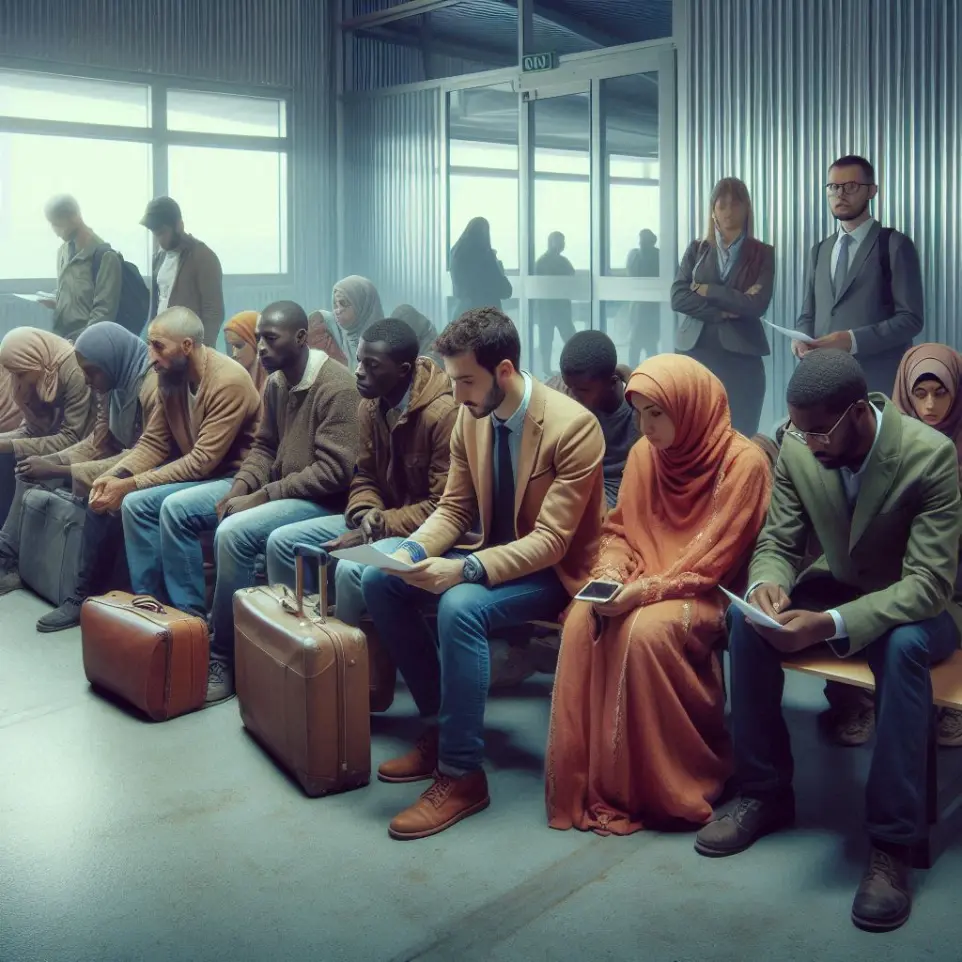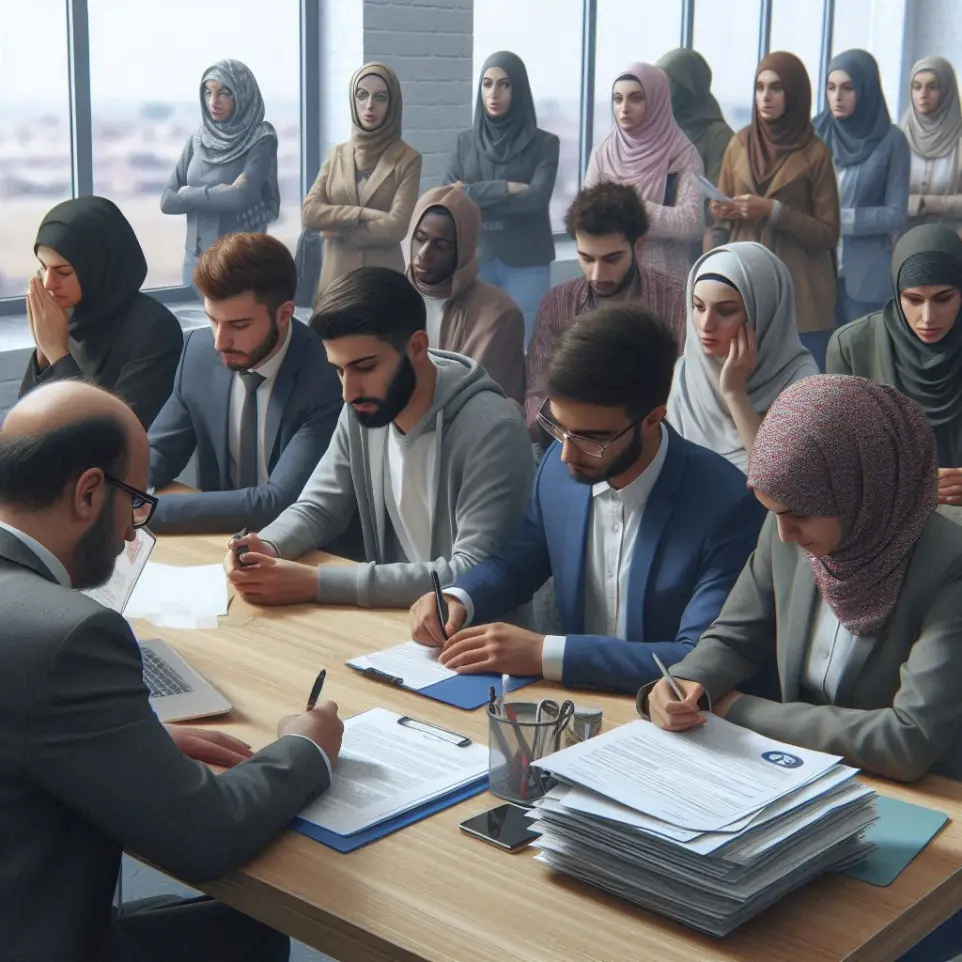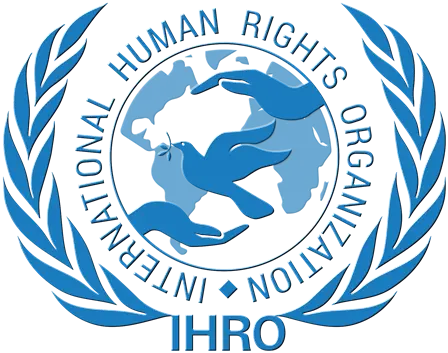Uncertain Fate: The Asylum Search and Its Bureaucratic Complications
In our article "Uncertain Fate: The Asylum Search and Its Bureaucratic Complications," we delve into the complex world of human rights related to asylum and the bureaucratic difficulties faced by asylum seekers. Prepare to explore this crucial topic in depth and discover how it affects thousands of people around the world. We invite you to delve into this fascinating analysis and continue exploring our website to learn more about rights in armed conflict.


In many countries, including those in Asia-Pacific, refugees and asylum seekers lack the legal right to remain, work, or access basic services. This affects their ability to stay safe and provide for their families' most basic needs. Asylum seekers often have very limited options.
Introduction
Asylum is a fundamental right recognized in the Universal Declaration of Human Rights, which protects people fleeing persecution, armed conflict, or serious violations of their fundamental rights in their countries of origin. This right, enshrined in international law, is essential to guaranteeing the protection and safety of those seeking refuge in another country.
Asylum is a concrete expression of the right to liberty and life, and its importance in human rights lies in safeguarding the integrity and dignity of people forced to leave their homes in search of safety and protection. It is crucial that States comply with their international obligations and grant asylum fairly and effectively, considering the individual circumstances of each applicant.
In this context, asylum becomes a fundamental pillar for the protection of human rights, providing refugees and displaced persons the opportunity to rebuild their lives away from danger and persecution.
The asylum application process can be extremely complex and fraught with bureaucratic obstacles that hinder access to international protection. Bureaucracy and a lack of resources in many countries' asylum systems can lead to significant delays in processing applications, prolonging the uncertainty and vulnerability of applicants.
Among the most common complications are the requirement for specific documentation, long waiting times for interviews and decisions, and rigorous eligibility requirements that can exclude people who truly need protection. These bureaucratic obstacles represent a significant barrier for those seeking asylum, increasing their vulnerability and exposing them to risky situations during their wait.
It is crucial that asylum systems be agile, efficient, and designed to guarantee timely access to international protection, preventing bureaucratic complications from becoming an insurmountable obstacle for those seeking safety and refuge.
Bureaucratic complications in the asylum application process have a devastating impact on the lives of refugees and displaced persons. The delays and uncertainty generated by bureaucracy can exacerbate their vulnerability, exposing them to risk, exploitation, and violence while they await a decision.
Furthermore, the emotional and psychological strain resulting from prolonged uncertainty can severely affect the mental health of asylum seekers, who have already experienced trauma and hardship in their countries of origin. The lack of certainty about their future and the possibility of being rejected increases anguish and stress, negatively impacting their emotional and psychological well-being.
Ultimately, bureaucratic complications in the asylum application process not only hinder access to international protection, but also affect the integrity and well-being of those seeking refuge, perpetuating their situation of vulnerability and helplessness.
Seeking Asylum: A Fundamental Right
The right to asylum is a fundamental pillar in the protection of human rights globally. This right, enshrined in the Universal Declaration of Human Rights, establishes that everyone has the right to seek and enjoy asylum in other countries if they are persecuted for political, religious, ethnic, or other reasons that put their life or liberty at risk. Asylum is, therefore, a crucial mechanism for safeguarding the integrity and dignity of people who find themselves in situations of extreme vulnerability in their countries of origin.
Seeking asylum is a reflection of the struggle for the protection of human rights in contexts of crisis, armed conflict, persecution, or generalized violence. It is a vital tool for ensuring the survival and safety of those forced to leave their homes in search of a safe and welcoming environment.
Amidst uncertainty and adversity, the right to asylum represents a glimmer of hope for those seeking refuge and protection in an unknown destination.
The asylum application process entails a series of legal and bureaucratic requirements that can be extremely complex and challenging for applicants. To qualify for refugee status, asylum seekers must provide detailed and truthful evidence of their claims, presenting documentary and testimonial evidence that supports their risk in their country of origin.
Processing an asylum application involves facing administrative, legal, and linguistic obstacles, which can make applicants more vulnerable. Furthermore, the process can take long periods of time, generating uncertainty and anxiety for those awaiting a response to their request for international protection.
The legal requirements for asylum vary by host country, adding an additional layer of complexity to this process. The interpretation and application of asylum laws can differ widely across nations, significantly influencing the experience of asylum seekers and the outcome of their claims.
Asylum seekers find themselves in a situation of extreme vulnerability, facing multiple challenges ranging from insecurity in their countries of origin to uncertainty and precariousness in the asylum application process. Many of them have experienced trauma, loss, and violations of their fundamental rights, generating an urgent need for protection and humanitarian support.
The vulnerability of asylum seekers is compounded by exposure to risks in the migration context, including human trafficking, discrimination, xenophobia, and lack of access to basic services. The effective protection of the human rights of these individuals requires a comprehensive approach that addresses not only their legal status but also their psychosocial, medical, and integration needs in the host society.
It is crucial to recognize the courage and resilience of asylum seekers, as well as the importance of ensuring an application process that respects their rights and provides the necessary support for their well-being and safety at a time of profound vulnerability.
Guaranteeing the right to asylum in situations of armed conflict faces several significant challenges affecting people seeking refuge in other countries. One of the main challenges is the lack of safe access to receiving countries, as borders may be closed or tightly controlled, making it difficult for refugees to enter and apply for asylum safely and in a timely manner. This situation can expose refugees to additional dangers, such as violence and exploitation, while seeking to reach safety.
Another significant challenge is the bureaucratic process for obtaining refugee status, which can be long and complex. The required documentation, interview procedures, and eligibility assessments can take months or even years, leaving applicants in a state of uncertainty and vulnerability. During this time, refugees may not have access to basic services, such as healthcare and education, exacerbating their humanitarian situation.
Furthermore, a lack of coordination and cooperation between receiving countries and international organizations can hamper the asylum process. Differences in asylum laws and policies, as well as a lack of harmonization in reception and protection procedures, can create additional obstacles for refugees seeking safety in the midst of armed conflict.
Bureaucratic Complications in the Asylum Process
Bureaucracy in the asylum process has a significant impact on its effectiveness. Long wait times, the complexity of the forms and required documentation, as well as changing requirements, can cause protracted delays and uncertainty for those seeking asylum. This situation can exacerbate the stress and anxiety of asylum seekers, many of whom have already experienced significant trauma in their countries of origin.
The impact of bureaucracy on the asylum process is also reflected in the ability of asylum systems to provide timely protection to those in need. Delays in processing applications can result in prolonged exposure to dangerous or adverse conditions, putting the safety and well-being of asylum seekers at risk.
Furthermore, bureaucratic complexity can lead to inaccurate or inconsistent decisions in asylum cases, affecting the fairness and justice of the process. Administrative or interpretive errors can have devastating consequences for applicants, underscoring the importance of addressing bureaucratic complications in the asylum process.
The requirements and procedures necessary to obtain asylum can be extremely challenging and significantly hinder the process. The complexity of the required documentation, which often includes evidence of persecution, threats, or violence, as well as the need to demonstrate eligibility for asylum, can represent a significant barrier for those seeking international protection.
Furthermore, bureaucratic requirements often vary by host country, adding an additional layer of complexity for applicants. The process of gathering evidence, preparing declarations, and navigating through the required forms can be overwhelming for many people who are already dealing with significant challenges due to their circumstances as refugees or displaced persons.
Lack of legal resources or support to complete asylum procedures can also represent a significant obstacle, underscoring the importance of ensuring access to legal advice and support services for those seeking asylum.
Refugees and displaced persons fleeing armed conflict face unique challenges when seeking asylum, which are compounded by bureaucratic complications. Lack of documentation, disrupted communication channels, and limited mobility can hamper these individuals' ability to complete asylum procedures in a timely and effective manner.
Furthermore, the chaotic and often unpredictable nature of armed conflict can make it difficult to gather evidence or testimony to support asylum claims. Instability and imminent danger can make it difficult for refugees to access the legal or administrative assistance necessary to complete the required procedures.
Bureaucratic complexity, therefore, represents an additional challenge for refugees and displaced persons in armed conflict, who seek safety and protection in extremely difficult circumstances. Addressing these bureaucratic complications is crucial to ensuring that those fleeing violence and persecution receive the protection they so desperately need.
Given the bureaucratic complications faced by asylum seekers, several responses and solutions have been proposed to address this problem. One of the key strategies is the simplification and streamlining of administrative processes for asylum applications. This involves reducing unnecessary procedures, implementing more efficient information systems, and allocating sufficient resources to speed up response times.
Another proposed solution is strengthening international cooperation and harmonizing procedures among countries receiving asylum seekers. This includes standardizing evaluation criteria, adopting measures to avoid double or triple processing of applications in different countries, and establishing collaborative mechanisms to equitably share burdens and responsibilities.
Furthermore, the importance of specialized training for personnel in charge of processing asylum applications is highlighted, in order to ensure dignified, respectful, and efficient treatment of asylum seekers. This includes training in cultural, gender, and diversity issues, as well as in identifying potential situations of vulnerability that require priority attention.
Guarantee of Rights in Armed Conflicts
In the legal and international context of human rights in armed conflict, significant challenges arise for the protection of human rights, particularly with regard to seeking asylum and the associated bureaucratic complications. The 1951 Convention relating to the Status of Refugees and its 1967 Protocol establish the international legal framework for the protection of persons fleeing their countries of origin due to armed conflict and persecution. However, the implementation of these legal instruments is often hampered by bureaucratic barriers and complex processes that hinder access to asylum and the protection of the fundamental rights of refugees and displaced persons.
The complexity of asylum-related legislation and regulations, coupled with the lack of harmonization between different national systems, creates an uncertain landscape for those seeking international protection. The requirements for proving refugee status, the necessary documentation, timelines, and administrative procedures vary considerably from country to country, which can create situations of vulnerability and lack of protection for those seeking asylum.
Furthermore, in many cases, refugees and displaced persons face additional challenges, such as prolonged detention, family separation, lack of access to basic services, and discrimination, which further exacerbates their situation and hinders the full exercise of their human rights in the context of armed conflict.
The particular challenges in the protection of the rights of refugees and displaced persons are manifested in the complexity of asylum application processes, the lack of resources and capacities of receiving States, as well as the need to ensure the safety and well-being of displaced persons in conflict settings. The identification and registration of refugees, the provision of adequate accommodation, healthcare, education, and employment opportunities are key aspects that face significant obstacles in many contexts.
Furthermore, the lack of coordination between humanitarian actors, government agencies, and civil society organizations, as well as the presence of armed groups and political instability, further complicate the effective protection of the rights of refugees and displaced persons in armed conflict settings.
It is important to recognize that border closures, asylum outsourcing policies, and anti-immigrant rhetoric in certain political contexts also contribute to the complexity of protecting the rights of refugees and displaced persons, generating situations of vulnerability and helplessness that require effective and coordinated responses at the national and international levels.
In guaranteeing the rights of refugees and displaced persons, human rights organizations and defenders play a crucial role in the defense, assistance, and protection of displaced persons. Through awareness-raising, advocacy, legal assistance, the provision of humanitarian services, and monitoring of the human rights situation, these organizations contribute to raising awareness of the needs and challenges faced by refugees and displaced persons, advocating for sustainable solutions that respect human rights.
The work of civil society organizations and human rights defenders is essential to holding States and other relevant actors accountable, as well as to promoting human rights-based approaches to the protection and assistance of refugees and displaced persons. Collaboration between these organizations, States, and international agencies is essential to ensuring comprehensive and effective responses to the challenges posed by asylum-seeking and bureaucratic complications in the context of armed conflict.
The protection of human rights in situations of armed conflict is a complex challenge that requires international cooperation as a fundamental pillar for its effectiveness. Collaboration between different countries, international organizations, and humanitarian agencies is crucial to ensure that the fundamental rights of people affected by these conflicts are respected.
International cooperation in the protection of human rights in armed conflicts enables the implementation of preventive measures, the monitoring of critical situations, the provision of humanitarian assistance, and accountability in cases of violations. Furthermore, it facilitates the coordination of efforts to find sustainable solutions that promote peace and justice in the affected areas.
Collaboration between States, non-governmental organizations, UN agencies, and other relevant actors is essential to address the complex challenges that arise in contexts of armed conflict and to ensure that the fundamental principles of human rights are respected, even in the most adverse circumstances.
Conclusions
Bureaucratic complications have a direct impact on the asylum search process for refugees and displaced persons. When administrative procedures are excessively long or cumbersome, the safety and well-being of these individuals seeking protection in a new country is jeopardized. The uncertainty and anxiety generated by bureaucracy can worsen their vulnerable situation, affecting their mental and emotional health.
Furthermore, bureaucratic complications can hinder access to basic services, such as healthcare, education, and employment, perpetuating the marginalization and precariousness in which many asylum seekers live. This can lead to situations of social and economic exclusion, hindering their integration into the host society.
It is essential that bureaucratic processes related to asylum be agile, transparent, and fair, to ensure that the human rights of refugees and displaced persons are respected and protected at all times.
The challenges to protecting human rights in conflict contexts are numerous and complex. Violence, political instability, and lack of resources are just some of the obstacles that hinder the guarantee of fundamental rights for refugees and displaced persons. The effective protection of these rights requires a comprehensive approach that addresses not only the immediate needs of affected people but also the underlying causes of conflict and displacement.
Prospects for the protection of human rights in conflict contexts include strengthening international protection mechanisms, cooperation between countries to address humanitarian crises, and sustainable support for affected communities. It is essential that the international community assume its responsibility to protect the human rights of refugees and displaced persons and that a culture of solidarity and mutual respect be promoted.
The protection of human rights in conflict contexts is an ongoing challenge, but it is essential to guarantee the dignity and safety of people who have had to flee their homes due to violence and persecution.
To improve the rights of refugees and displaced persons, governments and international organizations must implement policies and programs that comprehensively address the needs of these populations. This includes access to fair and efficient asylum procedures, protection against discrimination and violence, the provision of humanitarian assistance, and the promotion of durable solutions, such as local integration or relocation to other countries.
It is also essential to address the root causes of conflict and displacement through conflict prevention, the promotion of sustainable development, and the protection of human rights in all circumstances. Collaboration among different actors, including governments, non-governmental organizations, and civil society, is essential to achieving significant progress in protecting the rights of refugees and displaced persons.
Promoting empathy, understanding, and solidarity toward displaced persons is also crucial to building inclusive and welcoming societies where the human rights of all are respected, regardless of their origin or migration status.
In a world where asylum seeking is hampered by bureaucratic complications, it is imperative to remember that behind every process, lives are on hold, hopes are on hold, and rights are at stake. Let us face the future with the determination to build a world where human rights and asylum seeking are not hindered by bureaucracy, but supported by compassion and justice. Each of us has the power to make a difference, to be the voice that defends the dignity and rights of those seeking a safe place to call home.

